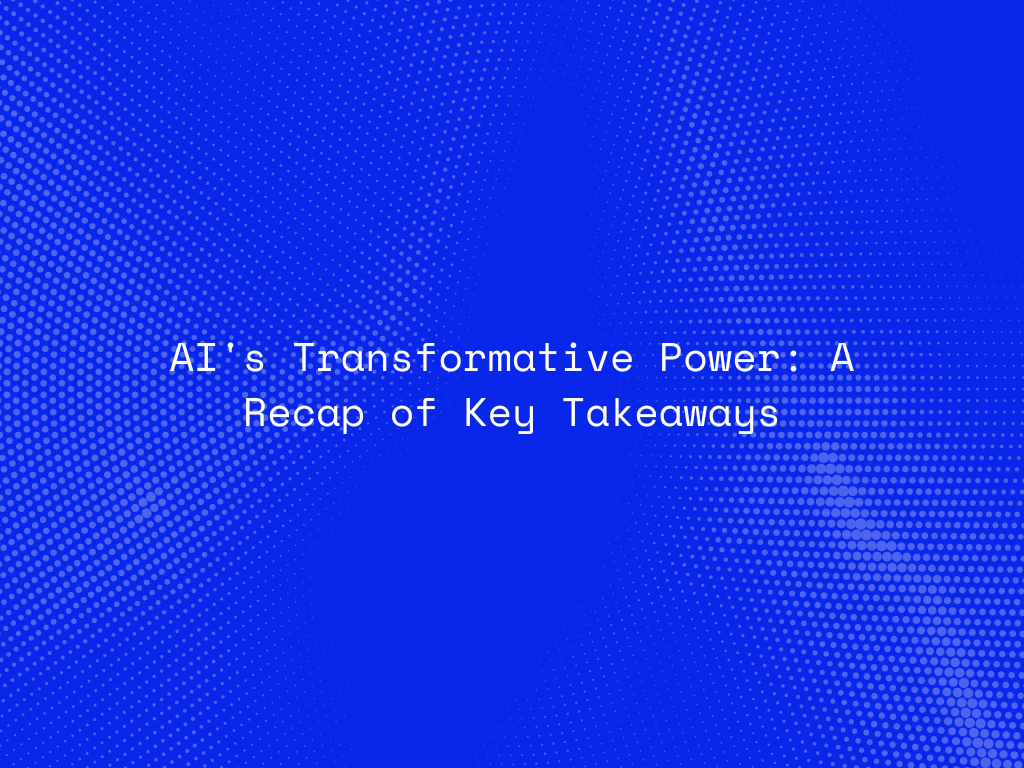Artificial Intelligence (AI) has rapidly evolved from a futuristic concept to an integral part of our daily lives. Its transformative power spans across various sectors, revolutionizing industries and creating new opportunities. This blog recaps the key takeaways of AI’s transformative impact, highlighting its benefits, applications, challenges, and future prospects.
The Benefits of AI
Increased Efficiency and Productivity
AI automates repetitive tasks, freeing up human workers to focus on more complex and creative endeavors. This increases overall efficiency and productivity across industries.
Improved Decision-Making
AI systems analyze vast amounts of data to provide actionable insights, helping organizations make more informed and accurate decisions. Predictive analytics and data-driven strategies enhance business outcomes.
Personalization
AI enables highly personalized experiences in sectors like marketing, healthcare, and e-commerce. By analyzing user behavior and preferences, AI delivers tailored recommendations and services.
Innovation and New Opportunities
AI drives innovation by enabling the development of new products, services, and business models. It opens up opportunities in emerging fields like autonomous vehicles, smart cities, and advanced robotics.
Connect With Us
Key Applications of AI
Healthcare
AI is transforming healthcare through applications such as diagnostic tools, personalized medicine, and robotic surgery. AI-powered systems analyze medical data to improve patient outcomes and streamline healthcare delivery.
Finance
In finance, AI enhances fraud detection, risk management, and algorithmic trading. AI-driven insights help financial institutions optimize operations and make better investment decisions.
Retail
AI personalizes the shopping experience by providing product recommendations, optimizing inventory management, and improving customer service through chatbots and virtual assistants.
Manufacturing
AI improves manufacturing processes through predictive maintenance, quality control, and supply chain optimization. AI-driven automation enhances productivity and reduces operational costs.
Transportation
AI powers autonomous vehicles, traffic management systems, and logistics optimization. These applications improve safety, efficiency, and sustainability in transportation.
Education
AI personalizes learning experiences, enabling adaptive learning platforms and intelligent tutoring systems. AI helps educators identify student needs and tailor instruction accordingly.
Connect With Us
Challenges and Considerations
Ethical Concerns
The use of AI raises ethical issues, including bias, fairness, and transparency. Ensuring that AI systems are ethical and unbiased is crucial for gaining public trust and avoiding discriminatory outcomes.
Data Privacy and Security
AI relies on large datasets, raising concerns about data privacy and security. Organizations must implement robust measures to protect sensitive information and comply with data protection regulations.
Job Displacement
While AI creates new job opportunities, it also displaces certain jobs through automation. Addressing the impact on the workforce and providing retraining and upskilling opportunities are essential.
Technical Challenges
Developing and deploying AI systems involves technical challenges, including data quality, algorithmic complexity, and scalability. Overcoming these challenges requires ongoing research and innovation.
The Future of AI
Advancements in AI Technology
Continued advancements in AI technology will lead to more sophisticated and capable AI systems. Innovations in areas like deep learning, reinforcement learning, and natural language processing will drive further progress.
Integration with Other Technologies
AI will increasingly integrate with other emerging technologies, such as the Internet of Things (IoT), blockchain, and 5G. These integrations will create new synergies and enhance the capabilities of AI applications.
Ethical AI Development
The focus on ethical AI development will grow, with increased efforts to ensure fairness, transparency, and accountability in AI systems. This will involve collaboration between policymakers, industry leaders, and researchers.
AI for Social Good
AI has the potential to address global challenges and contribute to social good. Applications in areas like environmental sustainability, healthcare accessibility, and disaster response will demonstrate AI’s positive impact on society.
Connect With Us
Conclusion
AI’s transformative power is undeniable, with significant benefits and applications across various industries. While challenges remain, the future of AI holds immense promise for innovation, efficiency, and personalized experiences. By addressing ethical considerations and embracing advancements, we can harness the full potential of AI to drive positive change and create new opportunities.
What are your thoughts on AI’s transformative power? Share your comments and join the conversation below!




